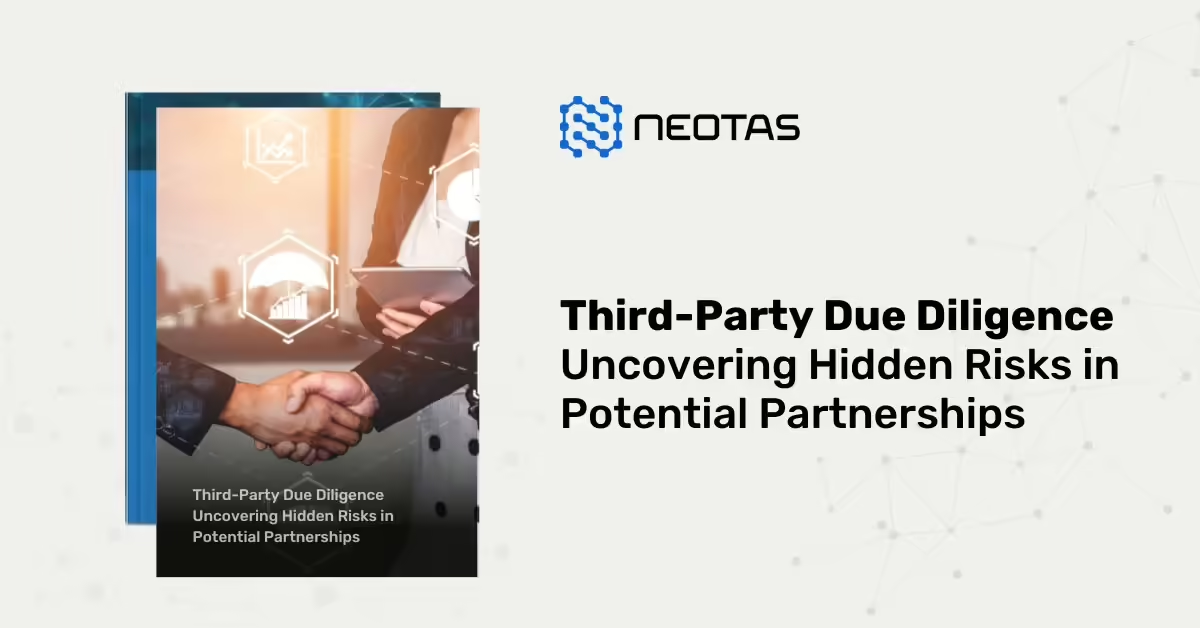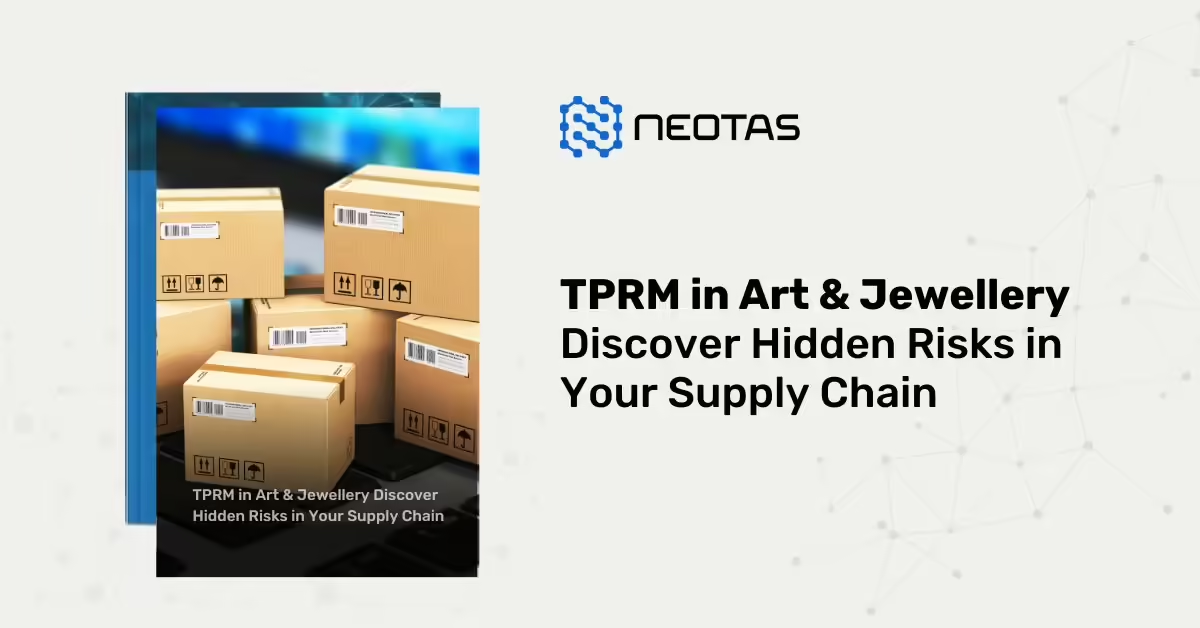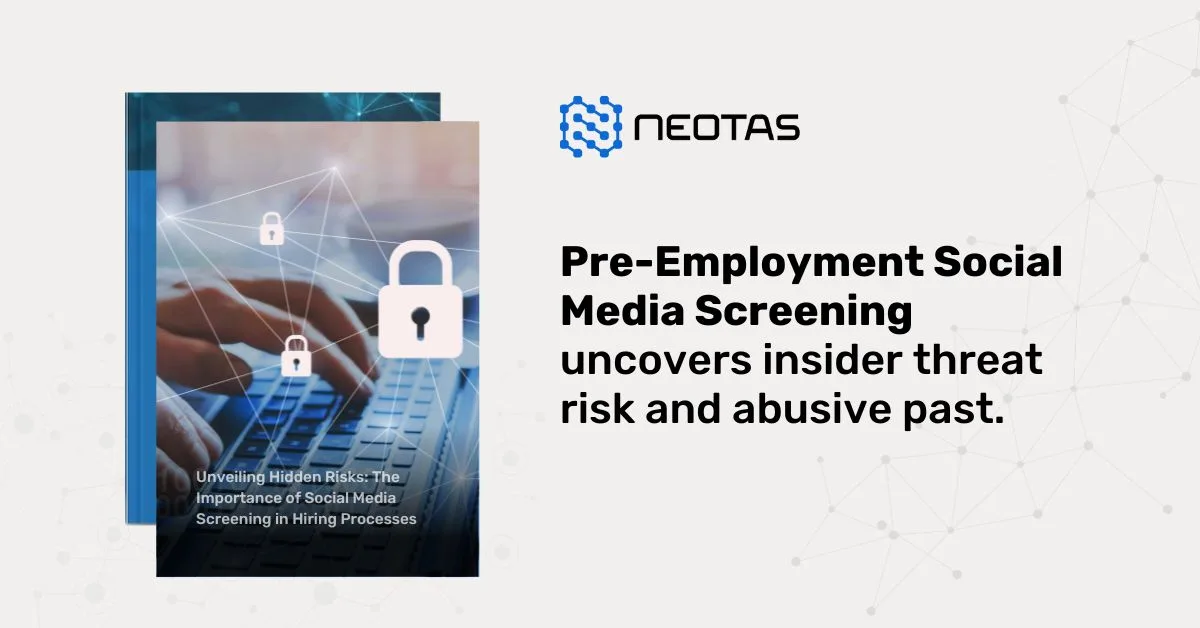Vendor Due Diligence
Enhance your vendor due diligence process with Neotas. Our rigorous analysis minimises risks, expedites sales, and increases value creation. Gain buyer confidence through objective assessments.
Vendor Due Diligence
Vendor Due Diligence
Enhance your vendor due diligence process with Neotas. Our rigorous analysis minimises risks, expedites sales, and increases value creation. Gain buyer confidence through objective assessments.
Actionable Insights for Informed Decisions
with Neotas Vendor Due Diligence
Purpose-Driven Approach
The primary purpose of Vendor Due Diligence is to address questions and concerns that potential buyers may have regarding the financial aspects of the business.
Analyses and Findings
The VDD process involves in-depth analyses of financial and tax-related matters. The findings are then presented to the seller and summarised in a report that is shared with potential buyers.
Clarity for Buyers
By conducting a VDD, the seller aims to provide clear and concise financial information to potential buyers. This transparency helps in building confidence and providing insight into the business's financial health and growth prospects.
Independence
The review is typically conducted by independent specialists who work alongside the company's management and their financial advisors. This impartiality ensures that relevant opportunities and challenges are identified objectively.
What is Vendor Due Diligence (VDD)?
Vendor Due Diligence (VDD) is a specialised approach to due diligence that shifts the perspective from the seller to the buyer. It involves a rigorous analysis of assets that are slated for sale, helping companies minimise risks, expedite the sales process, and enhance overall value creation. Vendor Due Diligence (VDD) is a financial review process conducted on behalf of a seller to provide potential buyers with a comprehensive understanding of the business being sold.
Objectives of Vendor Due Diligence
The primary objectives of Vendor Due Diligence (VDD) are to provide a comprehensive and objective assessment of a business being sold from the seller’s perspective.
Here are the key objectives:
- Minimise Risks for Potential Buyers: VDD aims to identify and disclose any potential risks or issues associated with the target business. This transparency helps potential buyers make informed decisions and reduces the likelihood of unexpected problems after the transaction.
- Enhance Transparency and Credibility: By conducting a thorough VDD, sellers demonstrate a commitment to transparency and build credibility with potential buyers. This fosters trust and confidence in the accuracy and completeness of the information provided.
- Present an Objective Financial Overview: VDD offers a clear and unbiased view of the target company’s financial health, performance, and potential risks. This enables potential buyers to assess the business’s financial stability and growth prospects.
- Streamline the Due Diligence Process: Providing a comprehensive VDD report to potential buyers accelerates their due diligence process. It offers them a head start and allows them to focus their efforts on areas of particular interest or concern.
- Facilitate Negotiations: VDD can facilitate negotiations by reducing uncertainties and providing a solid foundation for discussions. It helps establish realistic expectations and enables smoother negotiations between the parties involved.
- Identify Value Drivers and Opportunities: VDD aims to uncover value creation opportunities that may not be immediately evident. This could include potential cost savings, revenue enhancements, or strategic advantages that could enhance the business’s overall value.
- Address Issues Proactively: By conducting VDD, sellers have the opportunity to identify and address any potential issues or concerns before they become deal-breakers. This proactive approach can help maintain the momentum of the transaction.
- Enable Better Decision-Making for Buyers: VDD equips potential buyers with the information they need to make well-informed decisions about the acquisition. It provides them with a comprehensive understanding of the business’s strengths, weaknesses, and potential areas for improvement.
- Enhance Marketability of the Business: A thorough VDD report can enhance the marketability of the business by showcasing its strengths and potential for growth. This can attract a wider pool of potential buyers and potentially lead to more competitive offers.
- Build Trust with Stakeholders: VDD can also instill confidence in stakeholders beyond potential buyers, such as lenders, investors, and partners. It demonstrates a commitment to transparency and responsible business practices.
What are the benefits of vendor due diligence?
Gain buyer trust, identify risks, set realistic expectations, and address valuation-affecting issues in advance for seamless transactions.
Vendor Due Diligence plays a crucial role in facilitating a transparent and efficient sales process, benefiting both the seller and potential buyers. It allows for a more informed and confident decision-making process for all parties involved.
Benefits for the Seller:
- Increased Control: The seller gains greater control over the process and information being shared with potential buyers.
- Risk and Opportunities: Identifies financial, commercial, and operational risks and opportunities associated with the business.
- Expectation Management: Helps in setting the right expectations for potential buyers.
- Issue Handling: Enables the seller to address any identified issues that could impact the valuation of the business in advance.
Benefits for the Buyer:
- Balanced Information: The buyer receives financial information and analyses in an unbiased and objective manner.
- Informed Decision-Making: Provides a solid foundation for making informed decisions, including considerations for financing the acquisition.
- Efficiency Gains: Streamlines the due diligence process and reduces the need for extensive internal resources and consultants.
Benefits for the Company:
- Reduced Workload: Lessens the workload for the company’s management and other involved employees.
- Time Management: Allows management to balance their other responsibilities alongside the due diligence process.
- Early Issue Resolution: Enables management to address potential concerns raised by buyers at an early stage.
- Increased Ownership and Understanding: Helps in fostering a sense of ownership and a better understanding of the sales process among the management.
What are the different types of vendor due diligence?
Vendor Due Diligence (VDD) encompasses various types, each focusing on specific aspects of a business. Here are some common types of Vendor Due Diligence:
- Financial Due Diligence: Evaluates the financial health, performance, and stability of the target company. It involves an in-depth analysis of financial statements, cash flows, assets, liabilities, and financial metrics.
- Legal Due Diligence: Reviews all legal aspects of the target company, including contracts, licenses, permits, intellectual property rights, litigation history, compliance with regulations, and other legal matters.
- Operational Due Diligence: Assesses the operational processes, systems, and efficiency of the target company. It aims to identify any operational risks, inefficiencies, or areas for improvement.
- Commercial Due Diligence: Focuses on the market and industry in which the target company operates. It includes market analysis, customer trends, competitive landscape, growth potential, and any factors that may affect the company’s market position.
- Regulatory Due Diligence: Ensures that the target company is compliant with industry-specific regulations and government requirements. It verifies that the company is operating within legal boundaries and is not exposed to regulatory risks.
- Environmental Due Diligence: Evaluates the environmental impact and compliance of the target company’s operations. It includes assessments of environmental risks, compliance with environmental regulations, and potential liabilities related to environmental issues.
- IT Due Diligence: Focuses on the target company’s information technology systems, infrastructure, cybersecurity measures, software applications, and data management practices. It aims to identify any IT-related risks or vulnerabilities.
- Human Resources Due Diligence: Assesses the target company’s workforce, including employee contracts, benefits, compensation structures, compliance with labor laws, and any potential HR-related liabilities.
- Intellectual Property Due Diligence: Involves a thorough assessment of the target company’s intellectual property assets, such as patents, trademarks, copyrights, and trade secrets. It ensures the protection and value of these assets.
- Cultural Due Diligence: Focuses on the organisational culture and employee dynamics within the target company. It aims to assess cultural compatibility with the acquiring or partnering company.
- Tax Due Diligence: Involves an examination of the target company’s tax records, liabilities, credits, and potential tax exposure. It ensures compliance with tax laws and identifies any tax-related risks.
- Synergy Due Diligence: Evaluates potential synergies between the acquiring company and the target company, such as cost savings, revenue enhancements, and other strategic benefits of the transaction.
The specific types of due diligence conducted may vary depending on the nature of the transaction, industry, and the goals of the parties involved. Often, a combination of these due diligence types is conducted to provide a comprehensive assessment of the target company.
Key Components of Vendor Due Diligence
Vendor Due Diligence imposes responsibilities on both the third-party auditor and the target company, covering a spectrum of vital business considerations, including AML/CFT-specific factors. The processes and information required for VDD encompass:
- General target company information, including geographical location, taxpayer number, operational capacity, incorporation documents, and legal status.
- Disclosure of beneficial ownership of the target company.
- Historical financial data of the target company.
- Examination of the target company’s cash flow, encompassing asset expenditures.
- Evaluation of business risk and projected growth.
- Scrutiny of the target company’s debts, contingencies, and other liabilities.
- Assessment of the target company’s operational compliance performance.
In addition, AML-related due diligence may involve:
- Screening for industry-specific risks, such as third-party relationships or regulatory environment.
- Reviewing sanctions, watch lists, and restrictions imposed by governments and international authorities.
- Assessing political affiliations that may elevate the risk of money laundering.
- Checking for adverse media coverage related to the target company.
From an AML perspective, conducting site visits may be necessary to verify the implementation of specific AML procedures and protections. Validating the legitimacy of a company’s relationships, clients, and customers through direct communication is a crucial due diligence step for verifying money laundering risk.
In certain cases, vendors may be required to complete a due diligence questionnaire to further clarify or corroborate aspects of the audit.
Vendor Due Diligence Best Practices
Vendor Due Diligence (VDD) involves a comprehensive evaluation process, and following best practices ensures its effectiveness. Here are some key Vendor Due Diligence best practices:
- Engage Independent Experts: Employ third-party experts who are independent, impartial, and possess the necessary qualifications to conduct the due diligence process. This ensures objectivity and credibility in the assessment.
- Clearly Define Scope and Objectives: Clearly outline the scope of the due diligence process and establish specific objectives. This helps focus the evaluation on the most critical aspects of the target company.
- Customise the Process: Tailor the due diligence process to the unique characteristics and risks of the target company. Consider the industry, size, and nature of the business when designing the evaluation.
- Multi-Disciplinary Approach: Involve experts from various disciplines, including finance, legal, operations, compliance, and industry-specific knowledge, to provide a comprehensive assessment.
- Document Everything: Thoroughly document all findings, assessments, and analyses. This includes financial statements, legal documents, contracts, reports, and any other relevant information.
- Evaluate Financial Statements: Conduct a detailed analysis of the target company’s financial statements, including income statements, balance sheets, cash flow statements, and any related financial documents. Verify the accuracy and reliability of the financial data.
- Assess Legal and Regulatory Compliance: Conduct a thorough review of the target company’s legal and regulatory compliance, including contracts, licenses, permits, intellectual property, and any ongoing litigation.
- Identify Risks and Opportunities: Identify and prioritise potential risks and opportunities associated with the target company. This includes financial, legal, operational, market, and other relevant risks.
- Consider Market and Industry Factors: Analyse the market and industry in which the target company operates. Understand market trends, competition, growth potential, and any external factors that may impact the business.
- Perform Operational Assessment: Evaluate the target company’s operational processes, systems, and efficiency. Identify any operational risks, inefficiencies, or areas for improvement.
- Conduct Employee Interviews: If necessary, conduct interviews with key employees to gain insights into the company’s culture, management practices, and operational effectiveness.
- Assess Intellectual Property and Assets: Conduct a thorough assessment of the target company’s intellectual property assets, including patents, trademarks, copyrights, and proprietary technologies.
- Review Compliance with Environmental, Health, and Safety Standards: Evaluate the target company’s compliance with environmental, health, and safety regulations. Identify any potential liabilities or risks associated with environmental factors.
- Consider Integration Planning: Assess how the target company will be integrated into the acquiring company’s operations, and identify any challenges or opportunities in the integration process.
- By adhering to these best practices, companies can conduct a thorough and effective Vendor Due Diligence process, ultimately leading to more informed business decisions and a smoother transaction process.
Important factors to consider when preparing for the vendor due diligence
Preparing for Vendor Due Diligence (VDD) involves defining clear objectives, meticulous data collection, engaging expert evaluators, and verifying compliance. Scrutinise contracts, assess financial health, and ensure data security. Regular monitoring is key to maintaining an accurate risk profile throughout the process.
Thorough Data Verification: Ensure all provided information is accurate, complete, and up-to-date to establish trust and transparency.
Early Risk Identification: Proactively identify and address potential risks to mitigate any issues that may arise during the due diligence process.
Strategic Integration Planning: Develop a comprehensive plan for seamlessly integrating the target company’s operations post-acquisition, ensuring a smooth transition.
Enhance Your Business Transactions with Neotas Vendor Due Diligence
Neotas offers a comprehensive Vendor Due Diligence (VDD) service, providing you with a strategic advantage. Our expert team conducts rigorous analysis to assess assets destined for sale, minimising risks, accelerating the sales process, and ultimately maximising value creation. With Neotas, you’re equipped to make confident, informed decisions, ensuring the success of your transaction.
Improve Efficiencies
Improve analyst efficiencies, including cost and time reduction of minimum 25% with zero false positives.
Reduce Blindspots
The FCA recommends open source Internet checks as best practice (FG 18/5). Manage and reduce risk by incorporating 100% of online sources into your processes.
Ongoing Monitoring
Manage risk with hyper accurate ongoing monitoring. We will monitor 100% of publicly available online data to help identify relevant risks.
Book A Demo
Case Studies
Our clients can choose to use our advanced technology to interrogate vast data sources using their own methodologies. Our team of in-house expert analysts can also produce reports for you.
Frequently Asked Questions
Vendor Due Diligence (VDD) is a comprehensive evaluation process conducted by a seller on a business object before a sale. It offers potential buyers a clear understanding of the target company’s financial health, operational efficiency, and potential risks. VDD aims to provide transparency and build confidence by presenting an unbiased assessment from a buyer’s perspective.
Vendor Due Diligence is crucial because it minimises risks for potential buyers. It offers an independent and objective assessment, ensuring that buyers have a clear understanding of the target company’s financial status, potential risks, and growth opportunities. This transparency fosters trust and facilitates smoother transactions.
Due diligence is essential when engaging with external vendors to assess their reliability, financial stability, and adherence to legal and regulatory requirements. It helps businesses make informed decisions about selecting vendors, mitigating potential risks, and ensuring a mutually beneficial and secure business relationship.
Vendor Due Diligence should be initiated as early as possible in the sale process. It’s advisable to start before negotiations with potential buyers or partners begin. This allows for a thorough evaluation and provides ample time to address any identified issues.
Typically, the seller is responsible for covering the costs associated with Vendor Due Diligence. However, in some cases, especially in competitive markets, the buyer may share or cover the expenses to expedite the process.
A Vendor Due Diligence questionnaire allows for standardized information gathering from the target business. It helps in obtaining specific details needed for evaluation, ensuring consistency in the assessment.
Important questions in a Vendor Due Diligence questionnaire cover areas like financial performance, legal compliance, operational efficiency, market positioning, and potential risks or opportunities for the target company.
Customer Due Diligence (CDD) verifies customer identities and assesses financial activities to prevent money laundering. Vendor Due Diligence (VDD) is seller-focused, evaluating a company’s suitability for sale or partnership through financial, legal, and market assessments for informed business transactions.
Operational Due Diligence (ODD) assesses a company’s operational efficiency and processes. It scrutinizes areas like supply chain, IT systems, and compliance. Vendor Due Diligence (VDD) is seller-focused, evaluating financial health, legal compliance, and market position to provide potential buyers with a transparent overview for smoother transactions.
A Vendor Due Diligence Report is a detailed document summarising the findings of the VDD process. It encompasses crucial information about the target company, including its financial statements, legal compliance, operational efficiency, and potential risks. This report serves as a valuable resource for potential buyers, enabling them to make informed decisions about the acquisition.
Due Diligence report typically includes:
- Financial Statements and Analysis
- Legal and Regulatory Compliance
- Operational Assessments
- Market and Industry Analysis
- Risk Assessment and Opportunities
- Recommendations and Findings
A Vendor Due Diligence report provides a comprehensive summary of the evaluation process, offering potential buyers a detailed understanding of the target business’s strengths, weaknesses, and potential areas for improvement.
A Vendor Due Diligence report typically includes findings related to financial performance, legal and regulatory compliance, operational assessments, market analysis, risk evaluation, and recommendations for potential buyers.
Vendor Due Diligence provides several advantages for the selling company, including increased control over the process, identification of risks and opportunities, setting realistic expectations, and the ability to address any issues that may impact the business’s valuation in advance.
In M&A transactions, Vendor Due Diligence helps streamline the process by providing potential buyers with a comprehensive understanding of the business. It expedites negotiations and reduces the likelihood of surprises, ultimately leading to smoother and more successful transactions.
A Vendor Due Diligence checklist serves as a structured guide for assessing various aspects of a target business, ensuring that critical information is systematically reviewed during the due diligence process.
A comprehensive Vendor Due Diligence checklist typically includes items like financial statements, legal documents, operational assessments, market analysis, risk evaluation, and recommendations for potential buyers.
Streamline Your Due Diligence Process with
Neotas Vendor Due Diligence (VDD) Services
Explore How Our Comprehensive VDD Can Optimise Your Business Transactions Today!
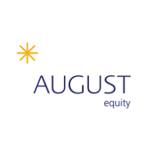





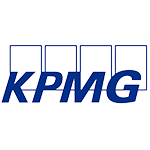












vendor due diligence
vendor due diligence checklist
vendor due diligence questionnaire
vendor due diligence report
what is vendor due diligence
benefits of vendor due diligence
commercial vendor due diligence
customer due diligence vendor
cyber security vendor due diligence
esg vendor due diligence
financial vendor due diligence
legal vendor due diligence
tax vendor due diligence
third party vendor due diligence checklist
vdd vendor due diligence
vendor assistance vs vendor due diligence
vendor commercial due diligence
vendor due diligence best practices
vendor due diligence checklist pdf
vendor due diligence checklist template
vendor due diligence form
vendor due diligence m&a
vendor due diligence meaning
vendor due diligence process
vendor due diligence questionnaire example
vendor due diligence questionnaire pdf
vendor due diligence reliance
vendor due diligence report example
vendor due diligence report pdf
vendor due diligence software
vendor due diligence vs commercial due diligence
vendor financial due diligence
vendor legal due diligence
what is a vendor due diligence
what is a vendor due diligence report
why is vendor due diligence important
due diligence on vendors
ffiec vendor due diligence checklist
gdpr vendor due diligence
gdpr vendor due diligence checklist
it vendor due diligence
it vendor due diligence checklist
saas vendor due diligence checklist
sec vendor due diligence
technology vendor due diligence
third party vendor due diligence
third party vendor due diligence questionnaire
vdr vendor due diligence
vendor due diligence checklist sample
vendor due diligence consultant
vendor due diligence consulting
vendor due diligence definition
vendor due diligence gdpr
vendor due diligence package
vendor due diligence platform
vendor due diligence policy
vendor due diligence process flow
vendor due diligence questionnaire sample
vendor due diligence questionnaire template
vendor due diligence questions
vendor due diligence report sample
vendor due diligence report template
vendor due diligence risk assessment
vendor due diligence services
vendor due diligence solutions
vendor due diligence spreadsheet
vendor due diligence template
vendor financial due diligence checklist
vendor management due diligence
vendor tax due diligence
why is due diligence necessary when dealing with external vendors
3rd party vendor due diligence
acquisition and vendor due diligence
aitec aima vendor due diligence questionnaire
anti corruption due diligence on new vendors
australia vendor due diligence shifts the burden
bank vendor due diligence
bank vendor due diligence checklist
bank vendor due diligence services
big 4 vendor financial due diligence cost
credit union vendor due diligence checklist
crowdsourcing vendors due diligence checks
cyber security vendor due diligence london
cyber security vendor due diligence manchester
cyber security vendor due diligence uk
cybersecurity vendor due diligence
deloitte vendor due diligence
difference between vendor assistance and vendor due diligence
differenfce between comercial and vendor due diligence
disadvantages of vendor due diligence
due diligence for vendors
due diligence vendor
due diligence vendor checklist
due diligence vendors
example of a vendor due diligence report
fdd v vendor due diligence
ffiec vendor due diligence
ffiec vendor management due diligence checklist
fia mifid 2 software vendor due diligence questionnaire
finra vendor due diligence
future of vendor due diligence
investment adviser vendor due diligence
kpmg vendor due diligence
legal vendor due diligence report
low risk vendor due diligence
m&a vendor due diligence
market cost of vendor due diligence
microsoft vendor due diligence
model vendor due diligence checklist
ongoing vendor due diligence
pwc vendor due diligence
ria vendor due diligence
ria vendor due diligence checklist
risk of crowdsourcing vendors due diligence checks
sample vendor due diligence letter
sell side vendor due diligence
software vendor due diligence
software vendor due diligence checklist
third party vendor due diligence policy
third-party vendor due diligence checklist
vat recovery vendor due diligence
vendor assist vs vendor due diligence
vendor due diligence and duty of care
vendor due diligence and gdpr
vendor due diligence association
vendor due diligence bank
vendor due diligence clause
vendor due diligence credit union
vendor due diligence definicion
vendor due diligence deloitte
vendor due diligence duty of care
vendor due diligence en francais
vendor due diligence example
vendor due diligence ey
vendor due diligence for banks
vendor due diligence france
vendor due diligence guide
vendor due diligence india
vendor due diligence investopedia
vendor due diligence items
vendor due diligence items banks
vendor due diligence items banks financial services
vendor due diligence legal
vendor due diligence limited
vendor due diligence limited compared to traditional
vendor due diligence london
vendor due diligence m&a manchester
vendor due diligence m&a uk
vendor due diligence management
vendor due diligence manchester
vendor due diligence meaning in hindi
vendor due diligence process banks financial services
vendor due diligence procurement
vendor due diligence reports
vendor due diligence review
vendor due diligence risk assessmen
vendor due diligence suomeksi
vendor due diligence tools
vendor due diligence traduction
vendor due diligence uk
vendor due diligence uk auction
vendor due diligence vdd
vendor due diligence vs buyer due diligence
vendor due diligence vs financial due diligence
vendor due diligence wiki
vendor due diligence wikipedia
vendor due dilligence et buyer due diligence
vendor financial due diligence cost
vendor financial due diligence fees
vendor initiated due diligence
vendor initiated due diligence craig bale
vendor legal due diligence checklist
vendor manage due diligence
vendor management due diligence checklist
vendor management oversight and due diligence
vendor security due diligence
vendor supplier due diligence
vendors due diligence
vendors due diligence who prepare
what is vendor due diligence report
when should vendor due diligence be completed
who pays for vendor due diligence
why conduct vendor due diligence
why is due diligence in vendor selection important

